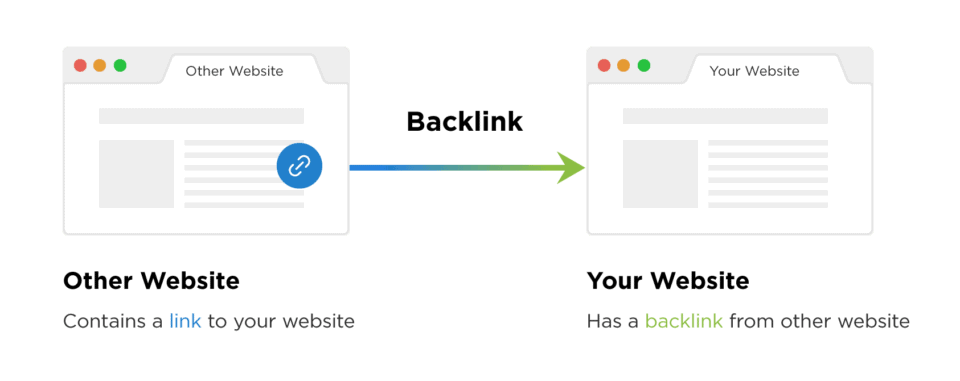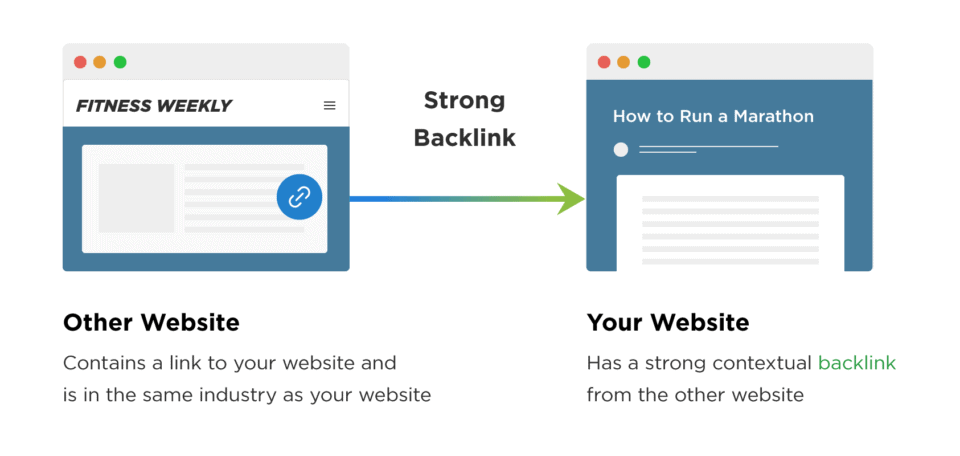
In today’s digital landscape, having a strong online presence has become paramount for businesses and individuals alike. With billions of websites competing for attention, it is crucial to stay ahead of the curve and make your mark in the vast sea of information available online. Enter backlinks – an often underestimated yet powerful tool that can significantly boost your website’s authority and SEO ranking. Backlinks are essentially links pointing towards your website from external sources – other websites, blogs, or social media platforms. These links serve as votes of confidence from these credible sources, signaling to search engines like Google that your website is trustworthy and relevant within its niche.
The more high-quality backlinks you have directing traffic to your site, the greater authority and visibility it will gain. But why exactly are backlinks so important? Firstly, they act as virtual endorsements for your website. When reputable sites link to yours, search engines view this positively because it indicates that others find value in what you have to offer. As a result, search engine algorithms prioritize websites with more backlinks when determining their rankings on search engine results pages (SERPs).
Secondly, acquiring quality inbound links helps drive organic traffic to your site. When users come across a well-placed backlink on another platform while browsing related content or researching specific topics within their domain of interest- they’re likely to follow it through out of curiosity or the desire for further information. This increased referral traffic not only exposes new audiences to your brand but also improves user engagement metrics like bounce rates and session duration—essential factors considered by search engines when calculating relevance during SERP reckoning. Not all backlinks are created equal though; quality trumps quantity when building an effective link profile strategy. While amassing hundreds or even thousands of random low-authority links may seem tempting at first glance- focusing on obtaining fewer but higher-quality ones yields better long-term results in terms of SEO ranking improvements.
High-quality backlinks are obtained from reputable websites with established authority and relevance to your niche. These links carry more weight in the eyes of search engines, as they demonstrate that you are connected with authoritative sources within your industry. In conclusion, optimizing your website’s authority and SEO ranking can be significantly enhanced by leveraging the power of backlinks. By acquiring high-quality links from credible sources, you not only increase your website’s visibility in organic search but also establish yourself as an authoritative voice in your industry. So invest time and effort into cultivating a robust link profile strategy – it may just be the key to unlocking unparalleled online success.
Understanding the Importance of Backlinks in SEO

Why Backlinks Are Crucial for SEO
Backlinks play a crucial role in improving your website’s authority and SEO ranking. These are external links from other websites that direct users to your site, acting as endorsements. Search engines like Google view backlinks as votes of confidence, indicating that your content is valuable and relevant.
The Benefits of Quality Backlinks
- Increased Visibility: When reputable websites link to yours, it signals to search engines that you have authoritative and trustworthy content. This can lead to higher search engine rankings, ultimately resulting in more organic traffic.
- Improved Domain Authority: A strong network of quality backlinks can boost your website’s domain authority. Higher domain authority means increased credibility within your industry, making it easier for potential customers or clients to find you online.
- More Referral Traffic: Backlinks act as pathways leading users from one website to another. By having legitimate backlinks from popular sites, you increase the chances of attracting new visitors who are genuinely interested in what you have to offer.
How Backlinks Improve Your Website’s Authority
Backlinks play a key role in improving your website’s authority and SEO ranking. Here are three reasons why:

- Increased Credibility: When other reputable websites link back to your site, it shows search engines that your content is trustworthy and valuable. This boost in credibility can enhance your website’s authority, making it more likely to rank higher in search engine results.
- Higher Organic Traffic: Backlinks act as pathways for organic traffic to reach your site from other websites. The more quality backlinks you have, the greater the chance of users discovering and visiting your website through these external sources.
- Enhanced SEO Performance: Search engine algorithms prioritize websites with strong backlink profiles, considering them as reliable information sources worth displaying to users. By strategically acquiring backlinks from authoritative websites within relevant niches, you can improve keyword rankings and drive more targeted organic traffic to your site.
In conclusion, incorporating a robust backlink strategy into your SEO efforts can significantly boost your website’s authority while driving increased organic traffic from relevant sources – ultimately leading to improved visibility and higher search engine rankings.
The Role of Backlinks in Boosting SEO Ranking
Backlinks are essential for improving your website’s authority and SEO ranking. When other reputable websites link to your site, search engines view this as a vote of confidence, indicating that your content is valuable and trustworthy. These inbound links act as virtual “endorsements” for your site, signaling to search engines that you have relevant information that others find useful.
By accumulating high-quality backlinks from authoritative sites, you can enhance your website’s credibility and increase its visibility on search engine results pages (SERPs). Search engines like Google consider the number and quality of backlinks when determining where to rank a website in their search results. Having numerous backlinks from reliable sources can help improve your SEO ranking by telling search engines that you offer valuable content worth promoting.
Moreover, not all backlinks are created equal – the relevancy between the linking page and yours also matters. For example, if you have a fitness blog and receive a backlink from another popular fitness-related website or influencer within the industry, it will carry more weight than receiving one from an unrelated source like a recipe blog. This relevance indicates to both users and search engines that your content is well-aligned with established experts or niche communities in the field, further boosting your credibility online.
Types of Backlinks and Their Impact on Website Authority
Backlinks come in various forms, each with its own impact on website authority. Here are three common types:
- Natural Backlinks: These links occur when other websites link to yours without any solicitation or prompting from you. Natural backlinks indicate that your content is valuable and trustworthy, making search engines view your website as authoritative.
- Editorial Backlinks: Editorial backlinks are gained when reputable sources reference your website within their content voluntarily. This type of link holds significant weight because it signifies that experts in the industry recognize the value of your content.
- Guest Post Backlinks: When you write high-quality articles for another website with a backlink to yours included, these are called guest post backlinks. They can boost your authority by showcasing your expertise and increasing exposure to relevant audiences.
Choosing effective strategies for building quality backlinks significantly impacts both the authority and visibility of a website.
Strategies for Building Quality Backlinks
Guest Posting and Outreach
One effective strategy for building quality backlinks is through guest posting and outreach. This involves reaching out to other websites in your industry and offering to write a guest post for them. By providing valuable content, you can establish yourself as an authority in the field and earn backlinks from reputable websites.
Creating Stellar Content
Creating stellar content that others want to link to is another important strategy for building quality backlinks. When you produce high-quality articles, infographics, videos or other types of content, people are more likely to share and link to it. This not only boosts your website’s authority but also generates organic links that search engines value highly.
Leveraging Social Media Platforms
Leveraging social media platforms can also help build quality backlinks. By promoting your content on platforms such as Facebook, Twitter, LinkedIn, and Pinterest, you increase its visibility and encourage others to link back to it. Additionally, actively participating in online communities related to your industry allows you to network with influencers who may be willing to link back to your website.
Conclusion:
By implementing these strategies consistently over time, you can gradually build a strong portfolio of high-quality backlinks that enhance your website’s authority and SEO ranking. Remember that building backlinks should focus on quality rather than quantity – one authoritative link outweighs multiple low-quality ones.
Leveraging Social Media for Backlink Opportunities
- Connect with influencers: Use social media platforms like Instagram, Twitter, and LinkedIn to identify influential individuals in your industry. Reach out to them and offer collaborations or ask if they would be interested in featuring a guest post on their blog with a link back to your website.
- Participate in online communities: Join relevant Facebook groups or Reddit threads where people discuss topics related to your website’s niche. Share valuable insights and engage with others, establishing yourself as an authority figure. Occasionally, you can include links back to relevant content on your website when it adds value to the conversation.
- Create shareable content: Craft high-quality articles, infographics, videos, or other visually appealing assets that are likely to resonate with your target audience. Share this content across different social media channels encouraging followers to repost and share it within their own networks – this increases the chances of earning valuable backlinks from established websites.
Remember: building relationships is key when leveraging social media for backlink opportunities – establish connections based on mutual trust, respect their time constraints by crafting targeted outreach messages concisely explaining how collaborating will benefit both parties involved!
The Dos and Don’ts of Backlink Building
Dos:
- Do focus on quality over quantity when it comes to backlinks. A few high-quality links from reputable websites can have a bigger impact than numerous low-quality links.
- Do reach out to other website owners or bloggers in your industry to request backlinks. Building relationships and providing value can increase the likelihood of receiving valuable links.
Don’ts:
- Don’t rely on link farms or paid backlink services, as these tactics are frowned upon by search engines and can result in penalties.
- Don’t engage in excessive reciprocal linking, where you trade backlinks with another website solely for SEO purposes. Search engines prefer organic, natural links that are earned through valuable content.
Remember, building authoritative backlinks takes time and effort. By following these dos and don’ts, you can enhance your website’s authority and improve its SEO ranking without resorting to unethical practices.
Analyzing and Monitoring Your Backlink Profile for Continued Success
Once you have established a strong backlink profile, it is crucial to regularly analyze and monitor its performance. This will help ensure that your website maintains its authority and high SEO ranking in the long run.
Track the Strength of Your Backlinks
To evaluate the effectiveness of your backlinks, monitor key metrics such as Domain Authority (DA) and Page Authority (PA). These scores indicate how trustworthy and influential a website or webpage is perceived to be by search engines. Aim for high DA/PA scores when building new backlinks.
Identify Toxic or Low-Quality Backlinks
Not all backlinks are beneficial; some may even harm your website’s ranking. Use tools like Google Search Console or Moz’s Link Explorer to identify toxic backlinks from spammy websites. Disavow these links promptly to avoid any negative impact on your site’s reputation.
Regularly Update Your Link Building Strategy
As search engine algorithms constantly evolve, so should your link building strategy. Stay informed about current trends and best practices in SEO, ensuring that you adapt accordingly. Regularly update old content, create fresh resources, collaborate with industry experts for guest blogging opportunities – all of which can contribute positively to maintaining a strong backlink profile.
